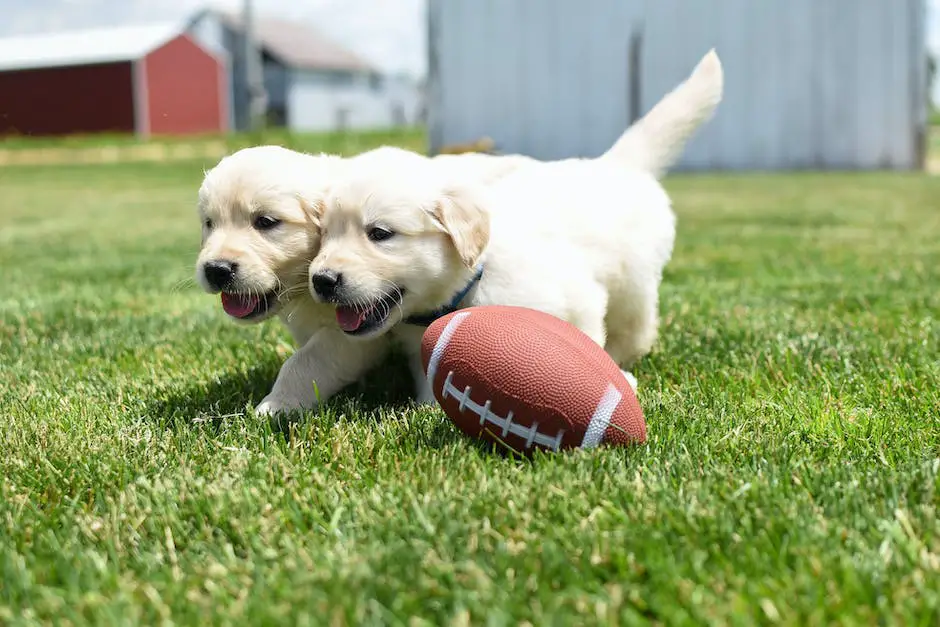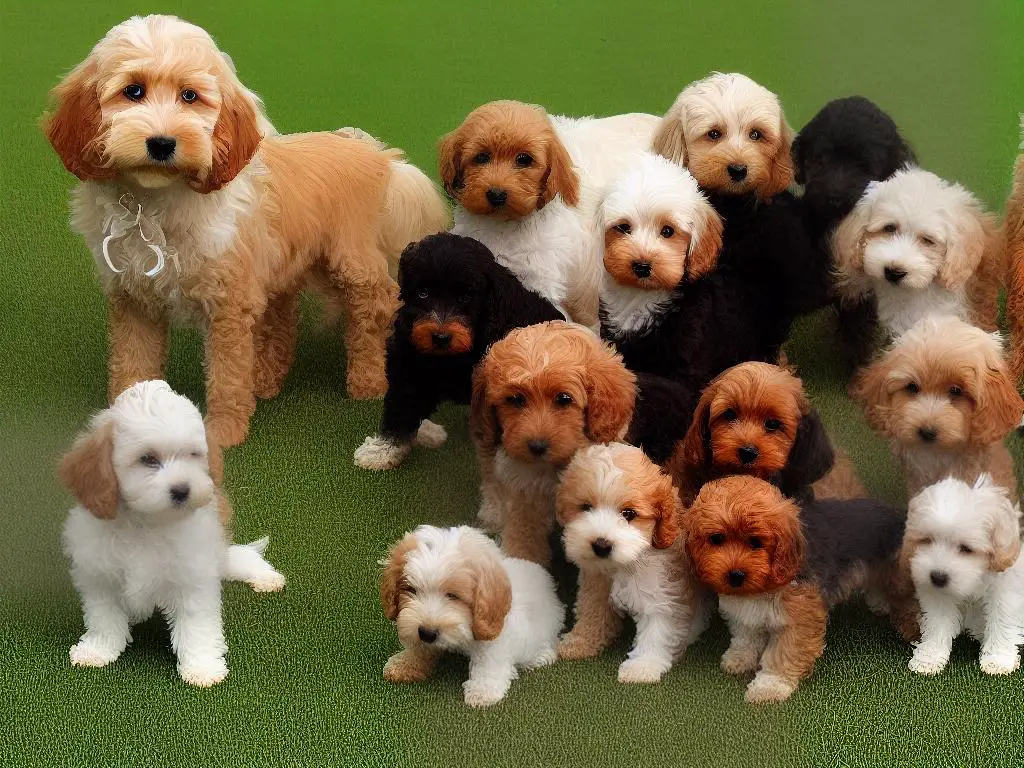Cockapoo Growth Stages: A Comprehensive Guide
Welcome to the exciting world of Cockapoos, a popular and delightful canine breed known for its friendly personality and unique blend of Poodle and Cocker Spaniel characteristics. This article will serve as a comprehensive guide to understanding and mastering the various growth stages of your beloved Cockapoo, from birth through their golden years.
Cockapoo Breed Overview
The Cockapoo breed is a popular hybrid breed that combines the intelligence and agility of the Poodle with the affectionate and outgoing personality of the Cocker Spaniel. This designer breed first appeared in the 1950s, and has quickly gained popularity due to its friendly nature, low-shedding coat, and adaptability to various environments. Cockapoos are known for their gentle temperament and trainability, making them excellent pets for families and individuals alike. In terms of breed characteristics, Cockapoos come in various colors and coat textures, with their adult size typically ranging from small to medium, depending on the size of their Poodle parent.When considering the growth stages of Cockapoos, it is essential to recognize that these pups go through various milestones and developmental stages on their journey to adulthood. During the first few weeks of life, newborn Cockapoo puppies are reliant on their mother for nourishment and warmth, as they lack the ability to regulate their body temperature. As they progress to the age of 2-4 months, the puppies become more independent, exploring their environment and developing crucial social skills through play and interaction with both their littermates and humans. The teething stage follows, marked by the loss of puppy teeth and the gradual replacement with adult teeth.As Cockapoo puppies transition from early to adolescence and adulthood stages, owners can expect to witness changes in their physical stature, energy levels, and behavior. This period typically occurs between 8 months and 1.5 years of age, and sees the pups undergo growth spurts and hormonal influence that contribute to their eventual adult size and temperament. During this time, it’s crucial for owners to maintain a consistent training regimen to ensure a well-behaved and sociable adult Cockapoo. With proper care and attention, owners of these lovable and versatile dogs can delight in watching their puppies grow and mature into the ideal companions they are known for.

Birth to 8 Weeks: Neonate & Puppyhood
Even before this crucial adolescent period, Cockapoo puppies go through several fascinating growth stages. From the moment they are born, they experience rapid growth and development. During the first few weeks of their lives, known as the neonatal stage, these puppies are completely dependent on their mother for warmth, food, and protection. This stage lasts until the puppies are about two weeks old and involves significant sensory development. At birth, their eyes and ears are closed, meaning they rely on their sense of touch, taste, and smell to navigate their environment. As they progress through the first two weeks, puppies will begin to open their eyes and ears, allowing them to become more aware of their surroundings and start exploring their environment more actively.
As the puppies approach the four-week mark and enter the beginning of the puppyhood stage, they will continue to develop both physically and socially. This period is critical for their overall growth, as they will begin to learn from their mother and siblings about appropriate behaviors and social skills. During this time, the puppies will begin to play and interact with one another, engaging in essential developmental milestones such as learning to walk, bite inhibition, and beginning to develop a basic understanding of hierarchy within the group. It is also during this time that puppies experience a significant growth spurt, nearly doubling their size by eight weeks of age.
During the essential period of six to eight weeks, Cockapoo puppies undergo critical socialization, becoming more receptive to learning appropriate interactions with people, other dogs, and their environment. This stage is vital for developing a happy and well-adjusted adult, as exposure to new sights, sounds, and smells helps shape their personality. It’s crucial to provide positive experiences with other dogs, people, and situations that the Cockapoo may encounter throughout their life. Failing to expose them to various stimuli during this time can result in fear or aggression in adulthood. In addition to socialization, these young puppies will also begin to develop their motor skills and coordination during this stage, making it the perfect time to introduce basic training commands.

8 Weeks to 6 Months: Adolescence & Growth
As the Cockapoo puppy evolves from 8 weeks to 6 months, they enter a significant growth stage marked by adolescence, physical and behavioral changes. During this phase, the puppy will experience rapid growth and growth spurts, leading to weight gain and increased size. Concurrently, the puppy’s coat will begin to change in texture and color, gradually adopting the signature curly or wavy hair of a Cockapoo. Furthermore, around 3-4 months of age, their teeth will start falling out, making way for adult teeth. Consequently, owners should monitor dental development and consider providing their Cockapoo with chew toys to alleviate any discomfort during this transition.
On the behavioral front, Cockapoo puppies will start to display more energetic and playful behavior. Their curiosity will spark them to explore their environment constantly, and if not engaged in stimulating activities, can become destructive. Cockapoos are highly intelligent and sociable dogs; owners will need to invest time in socializing their puppy during these formative months. Early socialization is essential to prevent timidness or aggressive tendencies. This period is also when training should start in earnest – with positive reinforcement and patience to help shape desirable behaviors and habits in your Cockapoo.
During the adolescent and growth stage, healthcare is of utmost importance for Cockapoo puppies. It is essential to provide them with the necessary vaccinations to protect against severe diseases such as parvovirus, distemper, and rabies. Owners should consult their veterinarian to establish an appropriate vaccination schedule for their pup. Dental care is also crucial; regular teeth-brushing can maintain optimal oral health, along with providing teething aids such as chew toys. As Cockapoos are prone to hip dysplasia and patellar luxation, having your dog examined by a vet during this growth stage is advisable to monitor for early signs of these conditions and intervene if necessary.

6 Months to 1 Year: Adolescence & Maturity
From six months to one year, a Cockapoo goes through a significant growth phase referred to as adolescence and maturity. At this stage, the pup starts to develop more social skills and interactions, both with humans and other dogs. This period is critical in shaping the behavior of the Cockapoo, as it begins to establish more independence and may start testing boundaries. Owners should continue frequent socialization, exposing the dog to new situations, people, and animals to help the young Cockapoo become well-adjusted and maintain a balanced temperament in the long term. Obedience training is also crucial at this stage to ensure the pup understands and adheres to household rules and basic commands.
During this time, it’s essential to remain consistent with obedience training and ensure the Cockapoo is receiving appropriate physical and mental stimulation. Regular exercise is necessary, as it helps to keep the pup entertained and prevent undesirable behaviors, such as destructive chewing or excessive barking. As intelligence and problem-solving abilities continue to develop, mental stimulation can also be provided through interactive toys, puzzles, and advanced obedience classes. These activities will help cultivate a strong bond between the owner and dog and allow the Cockapoo to learn how to utilize its energy productively and positively.
One crucial aspect of a Cockapoo’s health during the six months to one-year phase is the decision to spay or neuter the pup. This decision should be made in consultation with a veterinarian, who can advise on the best course of action for the dog’s overall health and wellbeing. Spaying or neutering offers numerous benefits, such as reducing the risk of certain cancers, minimizing aggressive behaviors, and controlling overpopulation. Additionally, these procedures typically coincide with the maturity stage of a Cockapoo, ensuring the dog maintains a happy and healthy life as it continues to grow and develop.

1 Year and Beyond: Adult & Senior Life
As they continue to grow, it’s crucial to maintain consistency with obedience training and provide the Cockapoo with appropriate physical and mental stimulation. Regular exercise is essential for keeping the pup entertained and preventing undesirable behaviors, such as destructive chewing or excessive barking. Intelligence and problem-solving abilities continue to develop, so mental stimulation can be provided through interactive toys, puzzles, and advanced obedience classes. These activities help cultivate a strong bond between the owner and the dog and teach the Cockapoo how to use its energy productively and positively. Between six months and one year, a critical aspect of the Cockapoo’s health is the decision to spay or neuter the pup. This decision should be made in consultation with a veterinarian, who can advise on the best course of action for the dog’s overall health and wellbeing. Spaying or neutering offers numerous benefits, such as reducing the risk of certain cancers, minimizing aggressive behaviors, and controlling overpopulation. Additionally, these procedures typically coincide with the maturity stage of a Cockapoo, ensuring the dog maintains a happy and healthy life as it continues to grow and develop. Upon reaching their first birthday, Cockapoos officially enter adulthood. At this stage, they will be more energetic, curious, and eager to learn. Their exercise routine should now include daily walks and playtime to ensure a balanced and happy life. As a responsible pet parent, it’s essential to stay on top of routine vet checkups and administer vaccines. Regular grooming and dental care will also ensure your Cockapoo maintains proper health throughout their adult life.As your Cockapoo advances in age, the transition to being a senior dog can be gradual and may not show significant changes in behavior. However, paying close attention to their exercise routine, adjusting their diet, and adapting to any health issues can contribute to a longer, happier life. Like all dog breeds, Cockapoos are not immune to certain health issues, such as hip dysplasia, patellar luxation, and eye disorders. Regular vet visits and senior dog screenings are essential to monitor your pet’s overall well-being.Throughout your Cockapoo’s life, it’s crucial to keep an eye on their mental health and overall quality of life. As they age, they may exhibit signs such as disorientation, confusion, loss of interest in playtime, or difficulty sleeping. To help ease your Cockapoo into their golden years, provide mental stimulation through puzzle toys, maintain a manageable exercise routine, and offer social interaction with other dogs and people. Always prioritize your pet’s comfort and quality of life, and managing their unique needs during these later stages will help your beloved Cockapoo enjoy a long and healthy life.

Cockapoo Growth & Weight Chart
To make informed decisions about your Cockapoo’s health, nutrition, and training, it’s important to understand the various growth stages and developmental milestones. A growth and weight chart is a valuable resource for monitoring your Cockapoo’s healthy development. Since Cockapoos are a hybrid breed born from Poodles and Cocker Spaniels, their growth rate can vary depending on the size of their Poodle parent. Be sure to keep track of their progress throughout their life as you provide them with the necessary care and support during each stage, ensuring their happiness and well-being.During the first few months of a Cockapoo’s life, they will experience rapid growth as they transition from a small puppy to an adolescent dog. It’s normal for a Cockapoo to double its birth weight within the first week, with steady weight gain continuing throughout this early phase. At 3 months, a Cockapoo should weigh around 5-10 pounds and be around 6-9 inches tall, depending on the size inherited from its Poodle parent. Owners should continue to monitor their Cockapoo’s weight and size as they approach adolescence, which typically occurs between 6 to 12 months. At this stage, a Cockapoo may reach 75% to 90% of its adult weight, ranging from 12 to 24 pounds.As a Cockapoo enthusiast or hobbyist, it is essential to understand how the growth stages of this fun and friendly breed progress. With a gradual transition into adulthood, a Cockapoo’s growth rate tends to slow down, generally reaching full adult size between 12-18 months. Even though their growth rate decreases, it is crucial for owners to keep track of their dog’s weight and discuss any concerns with a veterinarian. Adult Cockapoos can weigh anywhere from 12-45 pounds, depending on the size inherited from their Poodle parent. To ensure a healthy weight, muscle development, and overall well-being, it’s essential for owners to provide a balanced diet and regular exercise for their Cockapoos. Studying a Cockapoo growth and weight chart will give enthusiasts and hobbyists valuable insight into their dog’s lifelong health and happiness.

Common Health Issues & Lifespan
Being a crossbreed of Cocker Spaniels and Poodles, Cockapoos may inherit health issues commonly found in either breed. Some of the common health problems include hip dysplasia, cataracts, progressive retinal atrophy (PRA), and patellar luxation. Hip dysplasia, a hereditary condition affecting the hip joint, can be identified by regular veterinary check-ups and radiographs. Patellar luxation, which occurs when the kneecap dislocates or slips out of its natural position, causes pain and restricts movement. Continually monitoring the legs and joints of your Cockapoo will help detect this condition in its early stages and ensure the continued well-being of your lovable pet.Cataracts and progressive retinal atrophy affect the eyesight of Cockapoos. Cataracts cause a cloudiness in the lens of the eye, which can impair vision and, in severe cases, lead to blindness. PRA is characterized by the gradual degeneration of the retina, resulting in eventual vision loss. Both of these eye conditions can be detected through routine veterinary check-ups, and genetic testing is available to determine if a dog is at risk for developing PRA. Catching these conditions early allows for better management and potential treatment options.To promote a long and healthy lifespan for your Cockapoo, regular veterinary care is essential, along with proper grooming, a balanced diet, and consistent exercise. Feeding your dog a high-quality diet tailored to their specific age, size, and activity level can help provide the necessary nutrients for optimal health. Additionally, since Cockapoos are prone to obesity, portion control and maintaining a healthy weight can ward off associated health issues, such as diabetes and heart disease. Engaging in consistent exercise, like daily walks, can help maintain your Cockapoo’s overall wellbeing and fortify the bond between you and your beloved pet.

With this detailed look into the Cockapoo growth stages, you’re now equipped with the knowledge to provide the best possible care and support for your canine companion. Remember that every dog is unique, and understanding their developmental milestones will help you bond with your Cockapoo, maintain their overall health, and ensure they’re leading a happy, fulfilling life for years to come. Happy parenting to you and your Cockapoo!
